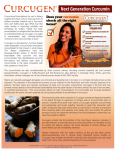Latin America
Finding right partner key to negotiating Latin American regulatory thicket, expert says

Laura Colin is a business development manager who has helped Cleveland-based Ganeden Biotech penetrate Latin American markets with its ingredient Ganeden BC30, a patented form of the spore-forming probiotic organism Bacillus coagulans. The robust nature of the ingredient has allowed Ganeden (which sold the supplement end of the business to Schiff Nutrition) to place the ingredient in a wide array of baked good, cereals and refrigerated beverages.
Colin speaks fluent Spanish and understands the culture, but even with that leg up, she said she wouldn’t take on the task of opening a new market on the continent without local help.
“About two years ago when Ganeden decided to penetrate international markets I became involved because I speak Spanish. Part of my responsibility includes being a key person in finding the right distributors, somebody who can represent Ganeden in these markets,” Colin told NutraIngrdients-USA.
Regulatory thicket
Ganeden has broken new ground for probiotic applications outside of the refrigerated dairy case. That meant breaking new ground on the regulatory front, too. And South America features a dizzying variety of regulatory schemes, Colin said.
“I am involved extensively in obtaining regulatory approvals. There are really no other spore formers that are approved for food in some of these countries. Each country has its own approval process and in order to understand that we have to form very good relationships with the distributors in these countries. We have to find people who are both well known in the industry and have good relationships with the regulatory authorities,” Colin said.
“Some countries have are a little more lenient and they will already have Bacillus on the list of probiotics that can be used. A lot of these countries are very bureaucratic. It’s not as well defined as here in getting FDA GRAS status.
“Argentina is well defined. Brazil is difficult, but it is well defined. But even there you can have a change of staff at an agency and then you have a new team that knows nothing about your ingredient,” she said.
Mexico leads the way
As far as the knowledge of probiotics as a category is concerned, Mexico leads the way, Colin said. The sale of the Yakult fermented beverage has paved the way with its unusual distribution system. Much of the product is sold local through neighborhood arrangements, she said.
“You’ll have the ‘Yakult lady’ and she’ll pick up the product and distribute it to her group of customers,” she said.
As a result, understanding of the ingredients is high in the market, she said.
“Your average consumer understands probiotics. They know that it’s good for digestive health they understand they are good bacteria,” she said.
Lately much of the uptake is being driven by the Mexican government’s commitment toward combating the rising tide of obesity in the country. Mexico recently replaced the US as the country with the world’s highest rate of obesity.
“The Mexican government is finding itself in a very difficult position because of the health problems of the population. Because of the socialized health system it is costing the government billions of pesos,” Colin said.
“They are taxing sodas and in addition they are limiting the advertising of high sugar content, high calorie content, high fat content foods at certain times of the day on TV when they don’t want kids seeing the ads. The sale of junk food is prohibited in all the schools. They have required all of the major companies to prove to the government that they are trying to make their products healthier,” Colin said.

















